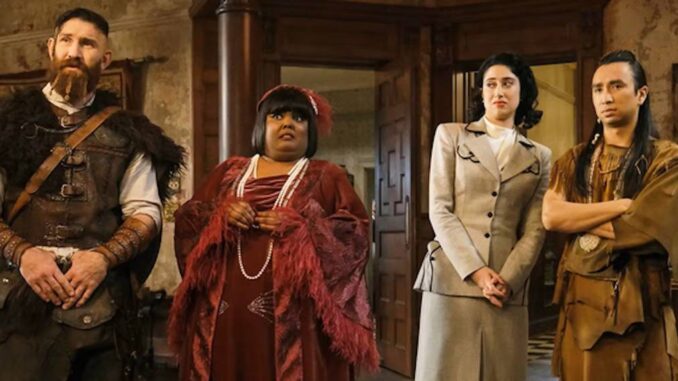
The Unraveling Thread: Why Ghosts Season 5 Needs To Fix One Season 4 Storyline’s Insulting Ending
In the cacophony of modern television, where comfort shows are a treasured balm, CBS's Ghosts stands as a beacon of warmth, wit, and genuinely endearing characters. Its premise – a young woman, Sam, inherits a crumbling estate and discovers she can see and communicate with the myriad spirits who died on the property – provides a fertile ground for humor, heartfelt moments, and surprisingly deep dives into human (and ghostly) nature. For three glorious seasons, the show has danced a delicate balance, crafting compelling character arcs while maintaining its signature lighthearted tone. Yet, Season 4, while still largely enjoyable, concluded one of its most pivotal and long-running mysteries with a reveal so jarringly disconnected and anti-climactic, it felt less like a resolution and more like a narrative insult. As Season 5 looms, the writers have a golden opportunity, indeed, a responsibility, to mend this unraveling thread: the cheapening of Alberta's murder mystery.
From the earliest episodes, the enigmatic death of Alberta Haynes, the sassy, big-voiced jazz singer from the 1920s, has been a central pillar of the Ghosts universe. Unlike most of the other spirits, whose demises were accidental or mundane, Alberta was murdered. This singular fact imbued her character with a tragic depth and her story with a captivating allure. Who poisoned her bourbon? Why? The mystery was meticulously woven into the fabric of the show, providing fodder for countless Sam-led investigations, ghost debates, and even the occasional visit from living descendants or historians. It wasn't just a plot device; it was a testament to Alberta's enduring impact, a central question tied to her legacy, her longing for justice, and the very history of Woodstone Mansion. Fans speculated wildly, theorizing about jealous bandmates, spurned lovers, or even one of the extant ghosts with a forgotten past. The stakes felt real, personal, and profoundly connected to Alberta’s very essence.
Then came the Season 4 finale, and with it, the cringe-inducing reveal. After seasons of intricate clues, red herrings, and the tantalizing promise of a meaningful resolution, we learned that Alberta was poisoned by Todd, a living, zealous super-fan of her music, who wanted to ensure her ghost remained at Woodstone forever, trapped within his shrine. The reason for the murder itself was dismissed as an accidental poisoning, a "mishap" while attempting to keep her from leaving the house. The narrative whiplash was palpable. After years of building genuine suspense, the culprit wasn't a historical figure with a complex motive, nor a character whose betrayal would have deep emotional resonance, but a random, largely unknown superfan introduced relatively late in the game. It was a twist that prioritized "shock value" over narrative integrity, rendering all the painstaking build-up, the character development derived from the investigation, and Alberta’s personal journey of seeking truth, ultimately pointless.
The insult lies in multiple layers. Firstly, it diminishes Alberta. Her legacy, which we were led to believe was grand and complex, is reduced to the obsession of a deranged fan. Her death, which should have been rooted in the passions, jealousies, or dark undercurrents of her vibrant life, becomes a mere consequence of a stranger’s bizarre fixation. This isn't a story of betrayal, revenge, or a secret revealed; it's a story of a random, unearned happenstance. Secondly, it undermines the audience's investment. We, the viewers, dedicated years to piecing together clues, investing emotionally in Alberta's quest for justice. To deliver a resolution that feels so fundamentally disconnected from the established world and its characters is to break a trust, suggesting that the journey itself was less important than a cheap, unsatisfying destination. It felt like a lazy narrative shortcut, sidestepping the difficult but rewarding work of crafting a conclusion that truly honored the long-running mystery.
So, how can Ghosts Season 5 fix this egregious misstep? The beauty of a paranormal comedy, particularly one with a history as rich as Woodstone's, is the flexibility of its narrative. While a full retcon might be too jarring, the show can cleverly introduce a new layer to Todd's confession. What if Todd was merely a pawn? What if the "accidental" poisoning was orchestrated by someone else, a more significant player with a deeper, more personal motive, who simply used Todd's fanatical devotion as a cover?
Imagine if Season 5 revealed that a ghost still present at Woodstone, perhaps even one we've grown to love or loathe, had a hand in Alberta's demise – not necessarily committing the act directly, but manipulating events or someone else (like Todd's ancestor, or another fanatic in the past) to ensure Alberta remained. This would reintroduce the personal stakes, the betrayal, and the profound emotional conflict that the original "Todd" reveal so carelessly discarded. Perhaps Elias, the malevolent, manipulative ghost in the vault, had a role, seeing Alberta's fame as a threat or finding amusement in her eternal torment. Or perhaps it was a descendant of an old rival, or a forgotten figure from the mansion's sordid past. Such a revelation would not only restore gravitas to Alberta's story but also deepen the mythology of Woodstone and its resident spirits, injecting a thrilling undercurrent of unresolved tension.
Ghosts thrives on its character dynamics and its commitment to heart. The insulting resolution of Alberta’s murder stands out as a rare misstep, a narrative blip that felt beneath the show’s usual cleverness. Season 5 has an opportunity to elevate this story, to honor Alberta’s legacy, and to reward the audience’s patience by re-contextualizing the mystery's ending. By adding a layer of depth and personal connection, the show can transform a cheap trick into a genuinely compelling twist, proving that even a beloved comfort show isn't afraid to confront its own narrative quicksand and emerge stronger, and more satisfying, than ever before.
